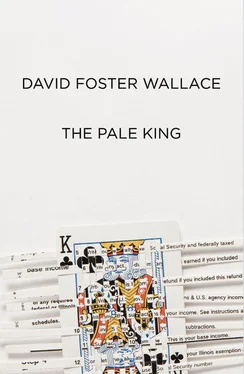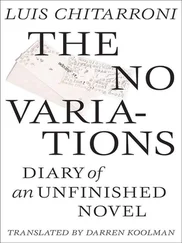Again, if any of that seems vague or ablated, it’s because I am giving you a very stripped down, mission-specific version of just who and where I was, life-situation-wise, for the thirteen months I spent as an IRS examiner. Moreover, I’m afraid that just how I landed in this government post at all is a background item that I can explain only obliquely, i.e., by ostensibly explaining why I can’t discuss it. 16First, I’d ask you to bear in mind the above-cited disinclination to have me return and serve out my limbo at home in Philo, which mutual reluctance in turn involves a whole lot of issues and history between my family and me that I couldn’t get into even if I wanted to (see below). Second, I would inform you that the city of Peoria IL is roughly ninety miles from Philo, which is a distance that permits general familial monitoring without any of the sort of detailed, close-quarters knowledge that might confer feelings of concern or responsibility. Third, I could direct your attention to Congress’s 1977 Fair Debt Collection Practices Act § 1101, which turns out to override the Federal Claims Collection Act’s § 106(c-d) and to authorize deferment of Guaranteed Student Loan repayments for documented employees of certain government agencies, including guess which one. Fourth, I am allowed, after exhaustive negotiations with the publisher’s counsel, to say that my thirteen-month contract, posting, and GS-9 civil service paygrade were the result of certain sub-rosa actions on the part of a certain unnamed relative 17with unspecified connections to the Midwest Regional Commissioner’s Office of a certain unnamed government agency. Last and most important, I am also permitted to say, albeit in language not wholly my own, that members of my family were almost unanimous in declining to sign the legal releases required for any further or more specific use, mention, or representation of the aforesaid relatives or any likeness thereof in any capacity, setting, form, or guise, inclusive of references sine damno, within the written work heretofore entitled The Pale King, and that this is why I can’t get into anything more specific about the overall hows and whys. End of explanation of absence of real explanation, which, however irksome or opaque it may come off, is (again) still preferable to having the question of why/how I was working at the Midwest Regional Examination Center just hang there huge and unaddressed through the whole text to follow, 18like the proverbial elephant in the room.
Here I should also probably address one other core-motivation-type question that bears on the matter of veracity and trust raised several ¶s above, viz., why a nonfiction memoir at all, since I’m primarily a fiction writer? Not to mention the question of why a memoir restricted to a single, long-past year I spent in exile from anything I even remotely cared about or was interested in, serving out time as little more than one tiny ephemeral dronelike cog in an immense federal bureaucracy? 19There are two different kinds of valid answer here, one being personal and the other more literary/humanistic. The personal stuff it’s initially tempting to say is just none of your business… except that one disadvantage of addressing you here directly and in person in the cultural present of 2005 is the fact that, as both you and I know, there is no longer any kind of clear line between personal and public, or rather between private vs. performative. Among obvious examples are web logs, reality television, cell-phone cameras, chat rooms… not to mention the dramatically increased popularity of the memoir as a literary genre. Of course popularity is, in this context, a synonym for profitability; and actually that fact alone should suffice, personal-motivation-wise. Consider that in 2003, the average author’s advance 20for a memoir was almost 2.5 times that paid for a work of fiction. The simple truth is that I, like so many other Americans, have suffered reverses in the volatile economy of the last few years, and these reverses have occurred at the same time that my financial obligations have increased along with my age and responsibilities 21; and meanwhile all sorts of US writers — some of whom I know personally, including one I actually had to lend money to for basic living expenses as late as spring 2001—have recently hit it big with memoirs, 22and I would be a rank hypocrite if I pretended that I was less attuned and receptive to market forces than anyone else.
As all mature people know, though, it’s possible for very different kinds of motives and emotions to coexist in the human soul. There is no way that a memoir like The Pale King could be written solely for financial gain. One paradox of professional writing is that books written solely for money and/or acclaim will almost never be good enough to garner either. The truth is that the larger narrative encompassing this Foreword has significant social and artistic value. That might sound conceited, but rest assured that I wouldn’t and couldn’t have put three years’ hard labor (plus an additional fifteen months of legal and editorial futzing) into The Pale King if I were not convinced it was true. Have, e.g., a look at the following, which was transcribed verbatim from remarks by Mr. DeWitt Glendenning Jr., the Director of the Midwest Regional Examination Center during most of my tenure there:
If you know the position a person takes on taxes, you can determine [his] whole philosophy. The tax code, once you get to know it, embodies all the essence of [human] life: greed, politics, power, goodness, charity.
To these qualities that Mr. Glendenning ascribed to the code I would respectfully add one more: boredom. Opacity. User-unfriendliness.
This all can be put another way. It might sound a bit dry and wonkish, but that’s because I’m boiling it down to the abstract skeleton:
1985 was a critical year for American taxation and for the Internal Revenue Service’s enforcement of the US tax code. In brief, that year saw not only fundamental changes in the Service’s operational mandate, but also the climax of an involved intra-Service battle between advocates and opponents of an increasingly automated, computerized tax system. For complex administrative reasons, the Midwest Regional Examination Center became one of the venues in which this battle’s crucial phase played out.
But that’s only part of it. As alluded to in an FN way above, subtending this operational battle over human vs. digital enforcement of the tax code was a deeper conflict over the very mission and raison of the Service, a conflict whose fallout extended from the corridors of power at Treasury and Triple-Six all the way down to the most staid and backwater District office. At the highest levels, the struggle here was between traditional or ‘conservative’ 23officials who saw tax and its administration as an arena of social justice and civic virtue, on the one hand, and those more progressive, ‘pragmatic’ policymakers who prized the market model, efficiency, and a maximum return on the investment of the Service’s annual budget. Distilled to its essence, the question was whether and to what extent the IRS should be operated like a for-profit business.
Probably that’s all I should say right here in terms of summary. If you know how to search and parse government archives, you can find voluminous history and theory on just about every side of the debate. It’s all in the public record.
But here’s the thing. Both then and now, very few ordinary Americans know anything about all this. Nor much about the deep changes the Service underwent in the mid-1980s, changes that today directly affect the way citizens’ tax obligations are determined and enforced. And the reason for this public ignorance is not secrecy. Despite the IRS’s well-documented paranoia and aversion to publicity, 24secrecy here had nothing to do with it. The real reason why US citizens were/are not aware of these conflicts, changes, and stakes is that the whole subject of tax policy and administration is dull. Massively, spectacularly dull.
Читать дальше












